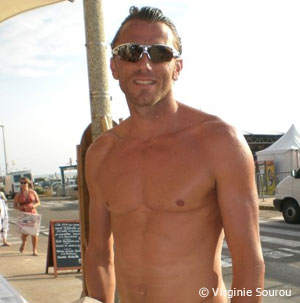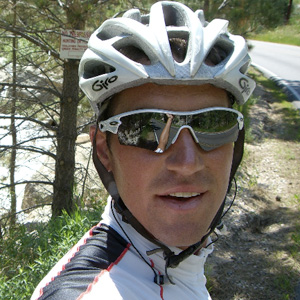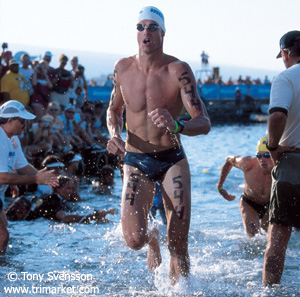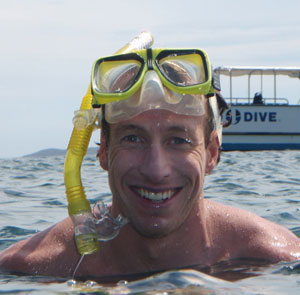Super fish John Flanagan
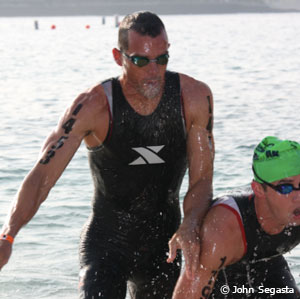
Hawaii resident John Flanagan posted some wicked fast swim times at the 2008 Ironman Hawaii and the 70.3 Clearwater Worlds with his 47:02 and 21:44 times respectively. He shared some of his thoughts with slowtwitch.
ST: John, you posted some very fast swims this year. Does it bug you a bit that some of your efforts have not gotten the attention they may deserve?
John: I appreciate the compliment. I have to use my strengths as much as I can during the race. I haven’t been bothered too much from a lack of attention on the swim. This sport entails mastering three disciplines. It is nice to get some attention from the swim, but I have some work to do for the rest of the race.
ST: Looking back I remember the times when pros and age groupers started the swim in Kona together and it wasn’t unusual for an age grouper to be first out of the water. Do you wish it was still like that?
John: I really do. It would be nice to be up there with the big dogs. I love to race, and it has been difficult at times at big races with so many different waves as an age grouper. The Honu 70.3 in Hawaii was great because we all started together, but I think that is one of the exceptions.
ST: Rumor has it that there is often some serious smack talking among the faster swimmers at races like IM Hawaii when “fighting” for position before the start. Can you confirm this?
John: I missed the smack talk, but I did get sucked under at the start. The surfers were brutal however keeping everyone back in line. It did make for a fair start however. I was very late to the start and wanted to get to the front of the line so I swam under the 15 or so meters worth of people lined up and popped up on the other side getting some dirty looks in the process.
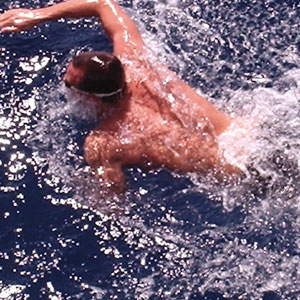
ST: You clearly come from a swimming background. Can you tell us a bit more though?
John: I swam in college at Auburn, and felt that I still had some more in me. I spent the next four years on the national team for open water swimming and then retired after the World Championships in 2001. I got lured back into training in 2007 with the addition of the 10K open water in the Olympics, but came up short at the U.S. trials.
ST: What or who inspired you to race triathlons?
John: My wife, Rae. She felt that I had gotten to such a high level of fitness training for the U.S. trials for open water swimming that I should just keep the momentum going. The challenge of something new has been exciting.
ST: So how is your cycling and running coming along?
John: It just keeps getting better. Swimming for so many years, I came to be stoked with improvements of hundredths of a second. Now to see minutes come off my time has been amazing. When you are new to the sport you can only get better and the process has been encouraging. I feel like I have had to learn 3 new sports this year: cycling, running, and triathlon.
ST: Considering that swimming is not proportionate in distance or time to running and biking, do you think the swim distance ought to be extended?
John: Obviously I am biased, but of course, the longer the swim, the better. I would love a format where you must race an hour of each discipline and see how far you can get. Or maybe a 10K swim/10K bike/10K run. That might just be enough to give me an advantage.
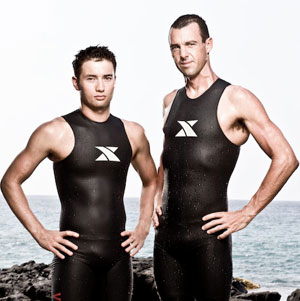
ST: Related to this topic. Should swimskins and wetsuits be outlawed as they appear to give weaker swimmers more of an advantage? ☺
John: That is a tough subject. While I love having more of an advantage with a non wetsuit swim, I also don’t like the cold water. I have been swimming open water for over 2 decades and the 70.3 World Championship in Clearwater was my first wetsuit swim ever. Xterra makes a great suit that wasn’t constricting while I swam, and it was quite fun. I do think the temperature that allows for wetsuit swims for triathlons are a bit on the high side, especially compared to open water swimming. I also understand the safety factor of it all.
As for the swimskins, they are new and the pool records show that they are an advantage. I don’t believe the swimskins make as much difference as the wetsuit would for body position in the water. I think better body position is where the weaker swimmers get the most advantage from the wetsuit.
ST: On a more serious note, how could the sport of triathlon be improved?
John: I am so new to the sport I feel I don’t know enough to answer that well. It is awesome to see the growth of the sport and the competitiveness from top to bottom. I have been blown away by the amazing athletes that compete in this sport. The ability of the pro and the age grouper athlete alike has been quite humbling.
ST: Please describe a typical hard training week for us.
John: My training has varied throughout this past year. First I trained for an Olympic distance race, then a 70.3, and then qualified and increased the training for the Ironman in Kona. The swimming has been cut back. I train about 10K a week until 2-3 weeks out of a race. Then I try to get in around 20K. Much different from the swimming days when I would do that much in a day. Leading up to Kona I got up to around 16hrs for peak weeks on the bike, and about 50mi on the run.
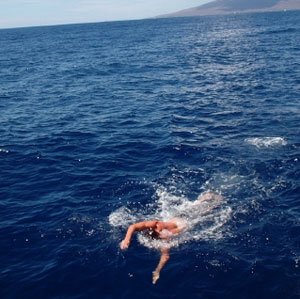
ST: What do you do to overcome a disappointing race?
John: I have had a lot of good learning lessons this year. I have been trying to take as much from my experiences, both good and bad, and trying to apply that to the next race. I’ve also learned that I am pretty slow at transitions.
ST: How are things going for you in terms of sponsorship?
John: I have gotten an amazing amount of support for being an amateur athlete. A local bike shop – Bike Factory here in Honolulu has helped me out. Xterra Wetsuits has been taking a chance on me, and I have gotten support from Maui Jim, Zoot, and also TYR that has been with me since open water swimming. I do wish I could find a way to get a stipend and be able to just train all day. It would be great to see how good you can really get without having to work a real job.
ST: How do you typically spend the off-season?
John: I like to spend as much time as I can with my wife and 2 kids. I also try to go surfing or paddle boarding when I can get a chance.
ST: Do you follow any other sports?
John: I love college football, though this year was rough with Auburn not making it to a bowl. I am a swim coach, so I keep up with swimming as well. Locally I follow surfing, and try and compete in some bodysurfing contests when I can. The NBA gets exciting come playoff time.
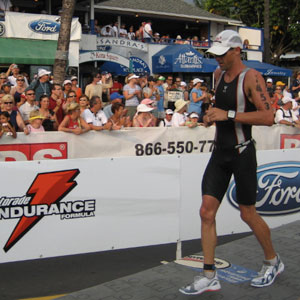
ST: Can you share with us some of your food likes and dislikes?
John: My diet has changed dramatically since I’ve been with my wife. I used to be a proponent of eating a balanced meal: 50% good for you and 50% bad for you. Now I eat well with lots of whole foods and organic produce. I have felt so much better, and have trained so much better since. I do enjoy a Pepsi whenever I can.
ST: What kind of music do you like?
John: Coming from a swimming background I love the fact that I can train running and biking while listening to music. I have quite a variety with over 12,000 songs on my I-pod. Anything from the 80s would be top priority, but I love music ranging from Neil Diamond to Metallica.
ST: What was the last book you read?
John: It has been a while since my last book. Most of my reading lately has been research articles in an attempt to finally finish my masters in exercise physiology. Usually I read nonfiction. The last book was Overthrow: America’s Century of Regime Change from Hawaii to Iraq, which despite the heavy title, was really good.
ST: Where do you see yourself in 5 years?
John: Getting back into the water for Open Water Trials after a 5 year retirement really opened me up to the ability of the body beyond the 30th year. I have read a lot of research that typically shows the peak of athletic potential at age 30 and a downward slide from there. Yet I believe most of those studies are done with people who become sedentary due to the demands of work. I felt stronger, and trained faster at 32 than I ever had. The sport of triathlon definitely shows that life does not end at 30. There are so many fast pros and age groupers and you see many triathletes winning races in their 40s and beyond. I hope to be still competing and testing the limits of the human potential.
ST: Is there anything else we should know about you?
John: I am hoping to emerge from a "swimmer doing triathlons" to a triathlete in the coming year.


